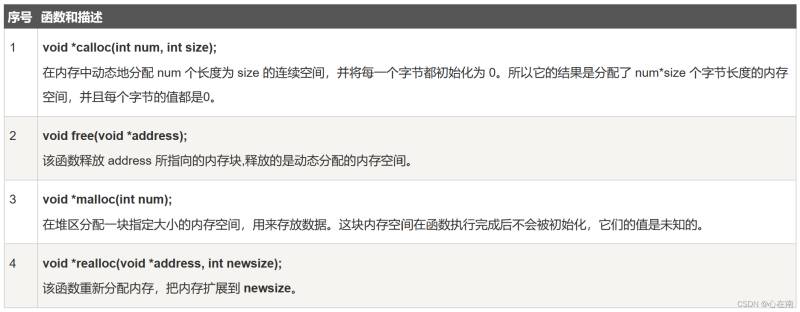C语言动态内存
心在南 人气:0前言:
简单记录一下,内存管理函数
为什么使用动态内存呢?
简单理解就是可以最大限度调用内存
用多少生成多少,不用时就释放而静止内存不能释放
动态可避免运行大程序导致内存溢出
C 语言为内存的分配和管理提供了几个函数:
头文件:<stdlib.h>

注意:void * 类型表示未确定类型的指针
1.malloc() 用法
分配一块大小为 num 的内存空间
#include <stdio.h>
#include <stdlib.h>
#include <string.h>
int main() {
char name[12];
char *test;
strcpy(name, "KiKiNiNi");
// 动态分配内存
test = (char *) malloc(26 * sizeof(char));
// (void *) malloc(int num) -> num = 26 * sizeof(char)
// void * 表示 未确定类型的指针
// 分配了一块内存空间 大小为 num 存放值是未知的
if (test == NULL) {
fprintf(stderr, "Error - unable to allocate required memory\n");
} else {
strcpy(test, "Maybe just like that!");
}
printf("Name = %s\n", name);
printf("Test: %s\n", test);
return 0;
}
// 运行结果
// Name = KiKiNiNi
// Test: Maybe just like that!
2.calloc() 用法
分配 num 个长度为 size 的连续空间
#include <stdio.h>
#include <stdlib.h>
#include <string.h>
int main() {
char name[12];
char *test;
strcpy(name, "KiKiNiNi");
// 动态分配内存
test = (void *) calloc(26, sizeof(char));
// (void *) calloc(int num, int size) -> num = 26 / size = sizeof(char)
// void * 表示 未确定类型的指针
// 分配了 num 个 大小为 size 的连续空间 存放值初始化为 0
if (test == NULL) {
fprintf(stderr, "Error - unable to allocate required memory\n");
} else {
strcpy(test, "Maybe just like that!");
}
printf("Name = %s\n", name);
printf("Test: %s\n", test);
return 0;
}
// 运行结果
// Name = KiKiNiNi
// Test: Maybe just like that!
3.realloc() 与 free() 用法
重新调整内存的大小和释放内存
#include <stdio.h>
#include <stdlib.h>
#include <string.h>
int main() {
char name[12];
char *test;
strcpy(name, "KiKiNiNi");
// 动态分配内存
test = (char *) malloc(26 * sizeof(char));
// (void *) malloc(int num) -> num = 26 * sizeof(char)
// void * 表示 未确定类型的指针
// 分配了一块内存空间 大小为 num 存放值是未知的
if (test == NULL) {
fprintf(stderr, "Error - unable to allocate required memory\n");
} else {
strcpy(test, "Maybe just like that!");
}
/* 假设您想要存储更大的描述信息 */
test = (char *) realloc(test, 100 * sizeof(char));
if (test == NULL) {
fprintf(stderr, "Error - unable to allocate required memory\n");
} else {
strcat(test, " It's a habit to love her.");
}
printf("Name = %s\n", name);
printf("Test: %s\n", test);
// 释放 test 内存空间
free(test);
return 0;
}
// 运行结果
// Name = KiKiNiNi
// Test: Maybe just like that! It's a habit to love her.
加载全部内容